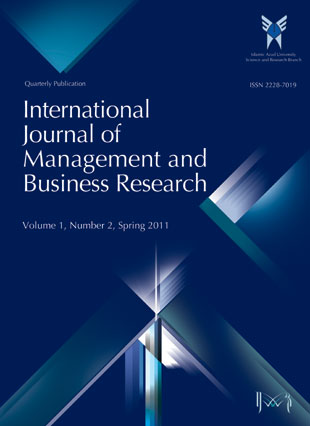فهرست مطالب

International Journal of Management and Business Research
Volume:1 Issue: 2, 2011
- تاریخ انتشار: 1390/07/20
- تعداد عناوین: 7
-
Page 47Planned Human Resource Development is critical to educating a skilled and efficient workforce. The present study aimed at identifying the main factors of planned human resource development in Iranian Social Security Organization Hospitals. The study is done through analysis of a questionnaire designed after identification of the main variables. Iran Social Security Organisation hospitals (the major governmental health institutions in Iran) were chosen as a sample among all Iranian healthcare centers (n=65). Content validity and construct validity were assured with expert judgment and the reliability of the questionnaire was determined using Cronbach’s alpha and Pearson correlation (first and second times). Cronbach’s alpha coefficient was respectively as 0.811and Pearson correlation was (p<0.001) 0.875. The questionnaire was filled out by the research community. After the sample size was proved to be sufficient the exploratory and confirmatory factors were analyzed.The findings of the present study indicated that two factors after the factor analysis of the component “Planning”. The factors were “master plan for education” and “career development path”. The calculated fitness indexes prove the desirability and appropriateness of the components and their structural relations.It is concluded that these factors have substantial roles in the Planned human resource development in these organization.
-
Page 53The present study aims at recognizing and analyzing the relationship among variables such as stress, social capital, self esteem and the locus of control that affect the high school students’ quality of life in Fars province, Iran. To this end 224 high school students form Shiraz, Kazerun, and Marvdasht were selected as participants based on Cluster Sampling. Cronbach’s alpha was used to measure the reliability of the questionnaire used, while its validity was determined through Item Analysis and expert consensus. The research findings indicated that there was a significant and positive correlation among such variables as self-esteem, locus of control, social capital and the students’ quality of life, while variables such as the quality of life and stress revealed a negative correlation. All coefficients at p<. 05 level were significant. The Beta for locus of control, self – esteem, social capital, and stress were 0.28, 0.23, 0.21, - 0.18 respectively. Locus of control plays a crucial role in the students’ quality of life. This is to say that internal locus of control means a better quality of life and living standards. All coefficients were significant at p< 0.05.
-
Page 59This study presents empirical evidence concerning the effect of different accounting standard on earnings management. Prior studies have shown that accounting standards influence earnings management. Tighter accounting standards regime restricts management’s descretion to manipulate accruals, and at the same time, induce more costly real earnings management activities. To investigate this issue, the levels of earnings management in the U.S. are compared with those of Germany. The data are obtained from the Osiris database. The sample comprises of 4,388 firm-year observations for U.S companies and 792 firm-year observations for German companies for the period of 2004-2007. To capture accrual earnings management, we use discretionary accrual, and to capture real earnings management we sum standardized abnormal cash flow from operation (CFO), abnormal production costs, and abnormal discretionary expenses. The result indicates that German’s relatively principle-based GAAP yields higher level of accrual-based earnings management than US’s relatively rule-based GAAP. On the other hand, we also document that US GAAP yields higher level real-based earnings management than German’s GAAP.
-
Page 69This paper provides a Fuzzy based decision support system (DSS) for risk analysis in E-tourism (Electronic Tourism) investment. In general term, E-tourism is the use of information and communication technology (ICT) in tourism which may allow operating tourism in least variable cost, least time and increased work efficiency. It is worth noting that there are many factors that affect the development of E-tourism. To demonstrate the effectiveness of the system, four factors of investment, human IT skill, E-tourism infrastructure and stability of the regions are considered in the present study. These parameters are fuzzified and a fuzzy rule-base has been developed for calculating risk factor for the E-tourism investment. The researchers used MATLAB software for fuzzifying the factors and gain the final risk. Case studies have been presented using the developed model. It shows that the investment possibility in developed region is high with low risk to invest.
-
Page 77The long term goal attaining of economic system management requires the establishment of a dynamic framework to integrate multiple perspectives. This article considers the problem of economic development in macro level. As economic systems are complex adaptive systems composed of numerous numbers of components of dynamic and multidimensional nature, dynamics method is applied in this research. It is to this end that the main economic development indicators are utilized for dynamic measurement modeling. This model assesses economic development in Iran over the period 1989-2009 and makes a prediction for the year 2019. The results indicate relationships between economic development components.
-
Page 85The internet has transformed the manner of conducting commercial transactions and has created regulatory gaps. These regulatory gaps may impact the effective development of electronic commerce. Attempts are being made to regulate electronic contracts both at the national and international level. The present research analyses these attempts, in particular the Electronic Transaction Legislation of Australia and the proposed new amendments. It also examines the role of international developments in assisting countries in their regulatory attempts. The research highlights the extent to which gaps are being filled and also examines the inadequacies of the Electronic Transactions Legislation of Australia.
-
Page 93In the initial models of economic growth, economic factors entered in to models but in the following models, non-economic factors entered in to models. Many broad studies were done on this subject by the economists, and already considerable results were obtained. Subjects such as corruption in the administrative bodies were new variables entering the literature of economic growth at that stage. In this area, we studied the impact of administrative corruption on the economic growth of ECO member countries and OPEC member countries. The paper presents a comparative study on oil producing developing countries and non-oil producing developing countries for the period of 2003-2008. All ECO member countries with the exception of Iran, Iraq and Afghanistan and also OPEC member countries are included in this study. The results of research based on Panel data approach indicate a reverse and significant relation effect between administrative corruption and economic growth of ECO member countries and OPEC member countries.


